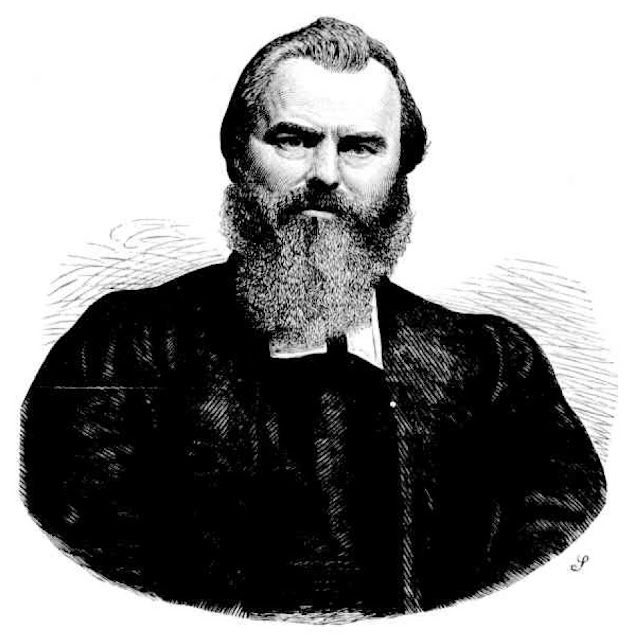REV. A. M. HENDERSON,
PASTOR OF THE COLLINS-STREET CONGREGATIONAL
CHURCH, AND PRESIDENT OF THE THEOLOGICAL
COLLEGE, MELBOURNE.
Mr. Henderson is descended from parents who represented—the one, a Huguenot, the other, a covenanting family. He was born in Ireland towards the end of the year 1820, and passed his boyhood at Anketell-grove in the county of Monaghan. After preparatory studies at the Monaghan Grammar School, he entered Trinity College, Dublin; his purpose at that period of his life being to qualify himself for the ministry in the Established Church. Taking into consideration his surpassing intellectual vigour, his diligence and success as a student, and the fact, moreover, that a Bishop of the Irish Establishment was a near relative, it is evident that he stood a pretty fair chance of preferment. Contact, however, with a fervent Wesleyan preacher led to a great spiritual change; and the change within shaped his outward life very differently from what he originally meant it to be.
Mr. Henderson attached himself to the Wesleyan body, and from 1841 to 1852 laborred ministerially in the principal circuits of Belfast, Cork and Dublin. Those who are acquainted with the history of Wesleyan Methodism will remember how about the period last mentioned that body was agitated from its centre to its extremities by questions involving the relations between the ministers and people. The effect of this agitation on Mr Henderson's mind was to lead him to a reconsideration of his views on ecclesiastical polity, and ultimately to a renunciation of Methodistic in favour of Congregational principles.
Immediately on becoming a Congregationalist, Mr. Henderson was invited to the pastorate of the Congregational Church in Cork; and four years afterwards he removed to Claremont Chapel, London. He remained nine years in London, labouring with much energy and success. The chapel rapidly filled, and had to be considerably enlarged. He also during this period contributed a good deal to the literature of the body with which he was now connected. He was for some years the principal reviewer in the columns of the Patriot; and some of the ablest articles which have appeared in the British Quarterly on the questions arising out of the conflict between the old and new theological and philosophical systems, have been from his pen.
In August, 1865, Mr Henderson arrived in Victoria, in compliance with an urgent request received from the Colonial Missionary Society that he should proceed to this country for the purpose of undertaking the pastorate of the church at Richmond, and the office of president in the Theolegical College, Melbourne. At a service held at Claremont Chapel, just on the eve of Mr Henderson's departure for Australia, Mr Binney remarked that though never before had he so deeply felt the serious responsibility of taking a pastor from his people, as he had in Mr Henderson's case, he was yet more satisfied than ever that the right man had been found for Melbourne and expressed the hope and expectation of great things from his labours in his new sphere of service.
Having observed Mr Henderson's career since his arrival on our shores, having heard him repeatedly both in the pulpit and on the platform, and having also occasion to notice the current of public opinion in his favour, we confidently endorse Mr Binney's remark and testify with as much satisfaction as Mr Binney himself that the right man has been found for the place. Let any one go to the Theatre Royal where Mr Henderson preaches on Sundays while the new church is being built; let him mark the peculiarly simple, but unaffected and manly style of speech, the lucid exposition of the text, the thorough mastery of the various phases of doctrine, the sympathy with all that is right and true in the movements and tendencies of the time; and he will come away with the reflection that it is no wonder that the crowds should flock to hear the man, and that were preachers more like him there would be less complaint of empty churches.
The structure now rising in Collin's-street for the accommodation of the church of which Mr. Henderson is pastor, is one of the handsomest in Australia. It was a very bold thing to aspire to the erection of a building in so sumptuous a style of architecture, but it was a wise thing; for few are the means so important and so likely to produce great results to the community of an infant state" as the preaching of such a man as Mr Henderson to such an audience as will assemble in such a building.







No comments